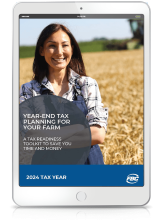Contents
Last updated: Nov. 21, 2024
Cultivate a Prosperous Future: Year-End Tax Strategies for Farmers
Like farming, tax planning is a year-round activity, and the end of the calendar year is the perfect time to implement strategies to maximize tax savings.
Here are some areas worth reviewing before the new year:
1. Long-Term Tax Strategy and Farm Transition
If there was ever a year to engage in some long-term tax planning and review your transition plan, the 2024 tax year is it.
This year, the government introduced inter-related tax changes significantly impacting farm property transfers and transition plans. While media attention was focused on the changes to the capital gains inclusion rate, other changes to the rules around Alternative Minimum Tax (AMT) and Lifetime Capital Gains Exemption (LGCE) were also made. Bill C-59 came into effect in June 2024, updating Intergenerational Business Transition (IBT) rules and opening up more options for your farm’s transition plan. Not to mention the Canada Pension Plan (CPP) enhancement if you have farm employees or draw a salary.
With so many different tax rules at play and interacting with each other, it is highly recommended you seek tax advice before to ensure your long-term tax strategy and farm transition plan are still maximizing your tax savings in this new reality.
2. Review Compensation Options Against CPP Enhancement
The way you pay yourself from your farm corporation can have a big impact on your finances. While dividends may seem like a good idea for taxes, they don’t contribute to your Registered Retirement Savings Plan (RRSP) contribution limit or the Canada Pension Plan (CPP). Plus, they won’t protect you if you get hurt or injured.
On the other hand, salaries can increase your CPP benefits, but the CPP enhancement may affect your immediate cash flow.
Talk to a tax expert to make the best choice for your farm and future savings.
3. Tax Deductible Expenses
You know the old saying: It takes money to make money. So why not take advantage of all the tax deductions or write-offs that apply to running your business?
From supplies to fuel to accounting fees, you can use tax deductions to lower your tax bill if you keep good records and follow the rules.
RELATED Tax Deductions for Canadian Farmers
You may also be eligible for a Capital Cost Allowance (CCA) for larger capital purchases, such as vehicles or equipment. See below for a more detailed explanation.
4. Capital Cost Allowance
Claim Capital Cost Allowance (CCA) deductions to spread the cost over multiple years for long-lasting assets like tools and equipment.
For example, if you purchase a tool worth over $500, these expenses fall under CCA Class 8. This class allows up to 20% of capital cost allowance per year (depreciation expense), which means that if you have a $2,000 expense, you can deduct up to $400 annually in CCA.
You also have a lot of flexibility with CCA and can claim the amount you’d like, from zero to the maximum allowed for the year. The key is to act before the end of the calendar year so you can time your expenses and CCA deductions to your advantage.
5. Tax Incentives For Asset Purchases
As of 2024, two tax incentive programs remain when purchasing assets for your farm: the Accelerated Investment Incentive (AII) and the Immediate Expensing Property rules.
While the AII is in its winddown phase (2024-2027), it can still allow you to deduct more of your CCA in the first year you purchase a capital item. Immediate expensing rules allow you to deduct the total cost of qualifying assets in the year they are acquired rather than depreciating them over time, and they are still available to individuals.
Each tax incentive has specific eligibility requirements, so speak to a tax expert about your situation before acting.
Tax Planning Lets You and Your Farm Prosper
Just as the quality of your seed can affect future yields, the quality of your tax planning affects future tax savings.
Being strategic about the timing of purchases and losses – especially for big-ticket items like vehicles, machinery and equipment – allows you to take advantage of specific tax rules and incentives.
Download our year-end tax planning guide for even more tips on creating a tax strategy that maximizes benefits for farmers and producers.
Want to learn more about creating a tax strategy tailored to the needs of farm families? Click the link below to connect with the FBC team. We would be happy to help!



